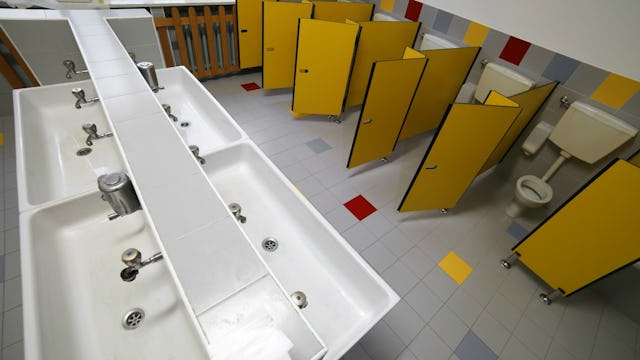Why Limiting Kids' Bathroom Breaks Is Harmful (And Ridiculous)

My youngest son was a late bloomer in the potty training department. In fact, he had accidents until he was 8 and needed a pull-up every night until he was 10. It didn’t matter if I limited liquids a few hours before bedtime or woke him to pee before I went to bed. He is 11 now, and when he says he has to go, he means it. There is a very short window between the urge to go and actually going, and I have the empty soda bottles (in case of an emergency) in my car to prove it.
I started to worry about this when he was 4 because his older brother and sister didn’t have a similar problem, but my pediatrician said not to worry — every child is different and the ability to “hold it” varies for each of them. She also told me the more I made an issue about it, the worse it would probably get. Punishing your child or making them feel ashamed for not making it to the toilet or having accidents makes them feel even more insecure, which will exacerbate the problem.
I quickly learned when my son entered elementary school, his bathroom breaks were limited — and I wasn’t happy about it. What would this mean for my son whose body didn’t work the way others did when it came to bathroom habits?
As my pediatrician pointed out, children develop differently, and they should be able to go to the bathroom when they need to without feeling like it’s a special privilege. Yet scheduled bathroom breaks and a limited number of passes are common practice in most schools in our country.
My fifth-grade son, for instance, gets three bathroom passes a month or during “transition time,” which varies each day. If he doesn’t use up his passes, he gets a reward, which is lunch with a teacher and a cookie.
Seriously? A reward for not going to the bathroom? Absurd.
Many people seem to have a concern about students ‘abusing’ their bathroom privileges. I don’t think this is as widespread as we’ve been led to believe, but if there is a child who abuses the privilege, they should be dealt with on an individual basis. We don’t need school-wide policies governing the bodily functions of all students, based on a select few.
And offering a prize because you ignore your urge to go to the bathroom or simply need a break to compose yourself sends the wrong message to our kids.
If you have a child who has struggled with potty training, it can often take longer for them to recognize the urge to go, and sometimes the sensation doesn’t hit them until it is nearly too late. To create an environment in which a child might have an accident in school because they have used up all their passes or would rather have a cookie is inexcusable.
Steve Hodges, MD, is a pediatric urologist said in an article for Parents, “I believe students must be allowed to use the restroom when the urge arises — not 10 or 20 or 60 minutes later. It’s a health issue, and it’s no joke.”
Hodges goes on to say, when kids hold their urine, it can lead to lasting damage to their young bladders, “increasing a child’s risk for accidents, bed wetting, and urinary tract infections.”
Ignoring the urge to poop is even worse. I don’t know how many times my child has come home telling me he had to poop, but held it all day because he wanted to have a special lunch, and that damn cookie.
I know as an adult I certainly could not deal with having scheduled bathroom breaks, and my bladder is fully developed. It’s too much to ask of our kids.
We can let our kids go to the bathroom when they need to go and still create consequences for misbehavior or abuse of the flexibility, such as goofing around in the hallway. But limiting bathroom breaks and handing out rewards for not using the toilet isn’t helping our kids, or furthering their education.
As Hodges says, “kids are damaging their internal organs — and self-esteem. Truly, nothing is more mortifying for a child than having to traipse to the school nurse with pee-soaked pants.”
Going to the bathroom is a bodily function, not something we can coordinate with someone else’s schedule. Bathroom breaks for relieving ourselves are essential. They should never be disguised as a privilege or taken away as a punishment.
This article was originally published on